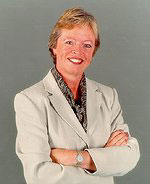

Ann Macintosh talks to Shebang about Democracy and the Internet.
Shebang: Can you give us a summary of what your organisation is about
Ann Macintosh: The International Teledemocracy Centre was set up by Napier University, which is a university in Edinburgh, in partnership with British Telecom, BT Scotland. It was established in August last year, for two reasons if you think about it. We've got these huge developments in mobile devices, - in technology. We can also take advantage of the increasing 'uptake' of this technology. So you've got better technology and more people using it. You had those two things. But in Scotland you had something that was unique. You had a new parliament.
Shebang: Brand new.
Ann Macintosh: Brand new Scottish Parliament, that said that it wanted to use technology innovatively.
Shebang: Right
Ann Macintosh: Part of the Standing Orders that set it up said we want to be more open, Accountable, accessible and we want to use technology innovatively. It was just right to set up my centre in Edinburgh at that time. It was exciting. And it's all about making the information - not just more accessible but more understandable. And that's where the computer work that I do comes in; the information has to be more understandable to non-experts. It's about making the democratic processes open - using the technology to do that, and it's about encouraging citizens - whether they are the voters of today or tomorrow, businesses, and voluntary organisations actually to participate in democratic decision-making, facilitating consultation, in a two way dialogue.
Shebang: You were taken away from your academic work, or you do both?
Ann Macintosh: I do both.
Shebang: Any desire to be a politician yourself? [LAUGHTER]
Ann Macintosh: You haven't heard what I think of politicians?
Shebang: Well, no, a lot of people go into politics to change things. You have now this fantastic base. You could change things.
Ann Macintosh: I think to be a good politician you really have to be good at communicating With people.
Shebang: You are brilliant at it.
Ann Macintosh: No I cannot do that -
Shebang: You're better typing onto a screen
Ann Macintosh: Yes. Yes. I suppose that's it. I am a technologist at heart and I would find it difficult debating with people. If I thought I could debate well, I might reconsider. That's the truthful answer.
Shebang: Yes you could never be a politician. You just gave a truthful answer...
Ann Macintosh: Well, if you thought - wouldn't everybody want to be a politician, if they Thought they could change the world, and make it a better place?
Shebang: t's your aim to achieve a greater democracy by using -
Ann Macintosh: (Contd.)Technologies. At the moment very straightforwardly. There's nothing Difficult if you like about the technology we're currently using. Its the Way it's used. It's being used innovatively both to motivate people and to Support them to be what I call active citizens. To participate. And it's That active participation that I'm wanting to encourage through the use of Technology. If you think, what is a citizen? What makes a good citizen? You Say, right, it's not about being an individual, it's about being a member of a group of people. And each individual in that group acts for the benefit of the group as a whole. Sometimes you have to take a decision that would actually go against yourself. That's citizenship. Then you say, O.K. then, to be a good citizen I have to be well-informed about issues. I have to be able to talk to people and discuss issues. I have to be able to see who agrees with me so I can build consensus. And I also need to understand why people are disagreeing with me
Shebang: Exactly. But what you are proposing here has to do with a system in which You have everyone getting together and saying, 'Let's all agree'. Sounds Good. Then somebody disagrees. And at that moment isn't also dangerous Because here you have open communication which also offers any kind of Opportunity for anyone who's hacked off about NOT being listened to joining Their own group and going off and making their own competing group, or Competing party or competing so-called democracy. How do you keep it from Fracturing. That's the opposite side of what the internet can bring, Potentially more democracy, potentially more trouble.
Ann Macintosh: Well what you want is for technology to support consensus-building. That's the hard issue. From the research point of view what I'm interested In is computer-supported collaborative argumentation, supporting the Consultation process. Where you can see who is agreeing and who is Disagreeing and why. So you are building these virtual communities. For Example, one person from the Swedish parliament at this conference I was at -
Shebang: That was this week?
Ann Macintosh: Last week, the 8th and 9th of September on Digital Citizenship
Shebang: Right.
Ann Macintosh: It was member of the Swedish parliament who was saying that to be this 'good Citizen' you really have to talk to people. Yes, that's fine. But it doesn't Have to be face to face. You can have electronic discussions. So the sort of systems that I'm building - researching - are systems that are open, so You can see the government process going on. And you can see what's Happening in the debate. You can be better informed because you can find out More easily with the system what are the arguments for and against.